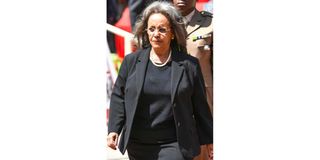Africa to involve women in gender-responsive climate action

Ethiopian President Sahle-Work Zewde in Nairobi on February 11, 2020. She was among leaders who attended the 66th session of the Pre-Africa Commission on the Status of Women in Addis Ababa.
What you need to know:
- The pledge was made during the 66th session of the Pre-Africa Commission on the Status of Women held on February 28 in Addis Ababa, Ethiopia.
- Participants highlighted the need to take urgent action in addressing climate change and deliver a healthy and sustainable future for young women and girls.
African countries at the Pre-Africa Commission on the Status of Women have pledged to involve women in implementing gender-responsive climate action plans.
During the 66th session of the commission held on February 28 in Addis Ababa, Ethiopia, African states undertook to provide capacity and technical support at regional and national levels to make climate change and disaster risk reduction plans gender-responsive.
The ministerial meeting, organised under the priority theme ‘Achieving gender-equality and the empowerment of all women and girls in the context of climate change, environmental and disaster risk reduction policies and programmes’, was convened by the African Union in Partnership with UN Women, UNECA and UNDP.
Affected more
The session arrived at a consensus that climate change affects women disproportionately, despite their crucial role in adaptation and mitigation.
‘’Women represent 90 per cent of employment in the agriculture sector in many African countries. This makes them vulnerable to impacts of climate change and disasters,’’ a statement from UN Women said.
The ministerial meeting was attended by UN entities and representatives from African states, including Sahle-Work Zewde, the President of Ethiopia, and Dr Ergogie Tesfaye, Ethiopia’s Minister for Women and Social Affairs, along with other African ministers for Gender Affairs.
The session highlighted the need to take urgent action in addressing climate change and deliver a healthy and sustainable future for young women and girls.
“All stakeholders and policy makers need to take urgent action and direct their resources to removing barriers faced by women in accessing social and economic capital, productive resources, information, skills and technology–all of which are vital in shaping and determining their ability to respond to climate change,’’ Dr Monique Nsanzabaganwa, the deputy chairperson of the African Union Commission said.
Way forward
The Pre-CSW expert consultation participants were urged by UN Women to incorporate and be guided by African women’s experiences in biodiversity conservation, sustainable food and agricultural systems.
Dr Maxime Houinato, the UN Women regional director for East and Southern Africa, pledged the support of the organisation through initiatives that focus on climate-smart agriculture.
“UN Women will continue to advocate gender equality and the inclusion of women and girls’ voices in policy dialogue spaces and programming on climate change mitigation and adaptation, as well as disaster risk reduction efforts,” he stated.
Additionally, African states at the session adopted the Common Africa Position to fulfill existing commitments under the Rio Conventions, address biodiversity, climate change and desertification; and the Sendai Framework, which addresses disaster risk.
Member states agreed to strengthen the capacity of national statistical offices that collect data for gender analysis of climate change, environmental and disaster risk reduction.





